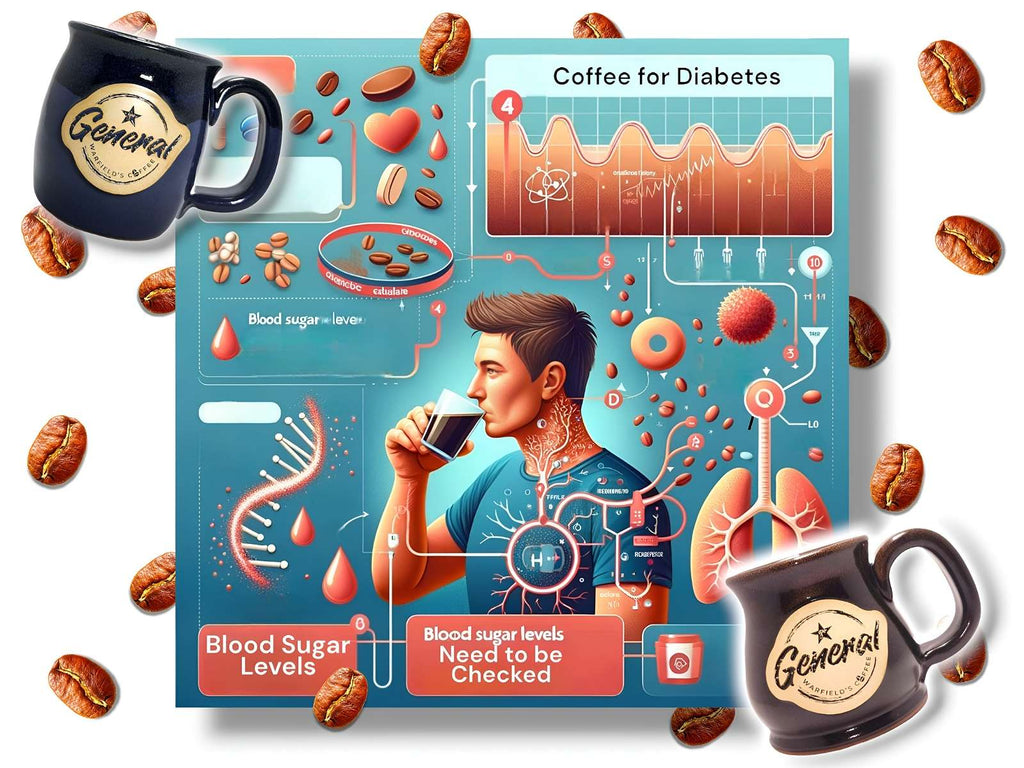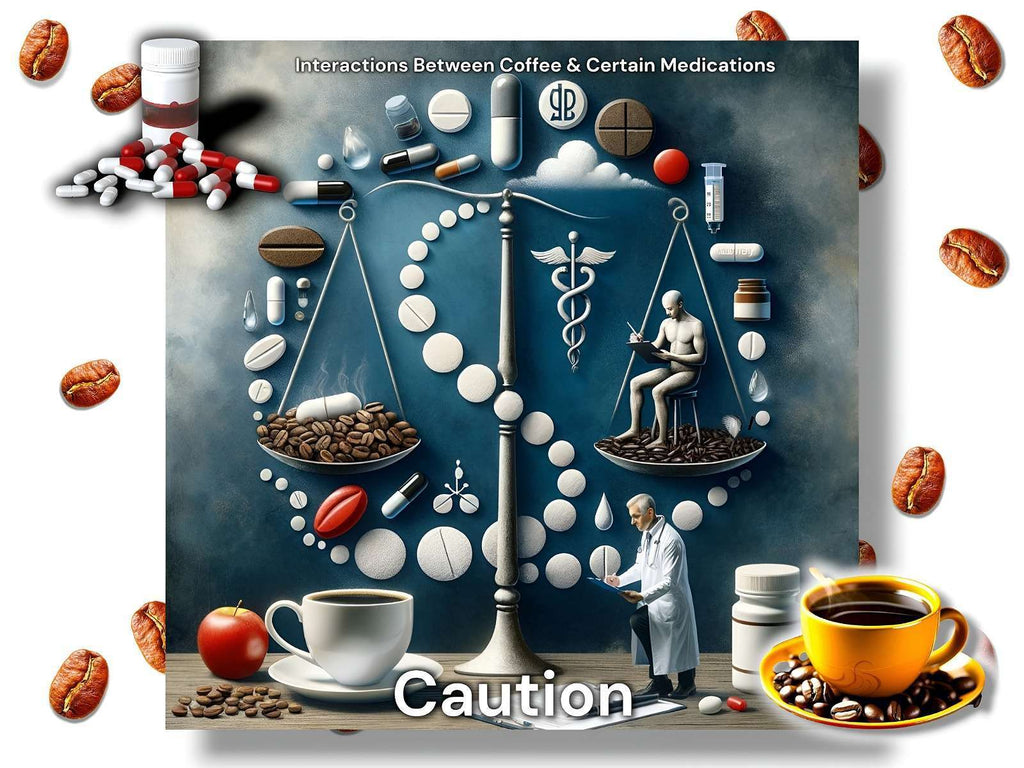Managing Diabetes with Specialty Grade Coffee
Introduction

Start your day off right with a hot cup of General Warfield's specialty-grade coffee to help manage your diabetes at the same time. This popular naturally caffeine-infused beverage may be more than just a flavorful pick-me-up—it could also be a powerful tool in helping to manage diabetes.
As an increasingly experienced SEO writer specializing in crafting engaging and conversion-optimized article introductions, I have seen firsthand the impact that coffee can have on blood sugar levels and overall health. Whether you prefer a latte, an espresso, or a simple black cup of joe, studies suggest that coffee consumption may play a role in reducing the risk of developing type 2 diabetes and improving insulin sensitivity [1]. With the right approach and moderation, coffee could become a routine part of your diabetes care plan.
In this article, we will explore the potential benefits of coffee for diabetes care, discuss recommended consumption guidelines, and share some delicious coffee recipes that are friendly to diabetes management. So grab your favorite mug and join us as we dive into the brewing success of coffee in the world of diabetes management.Understanding Diabetes: The Foundation of Management

Before exploring the role of specialty-grade coffee in diabetes care, it's essential to grasp what diabetes is and how it affects the body. Diabetes is a chronic condition characterized by elevated levels of glucose (sugar) in the blood. It occurs when the pancreas cannot produce enough insulin—a hormone that regulates blood sugar—or when the body cannot effectively use the insulin it produces. This imbalance can lead to various health complications over time, affecting the heart, blood vessels, eyes, kidneys, and nerves.
Types of Diabetes:
- Type 1 Diabetes: An autoimmune condition where the body attacks insulin-producing cells in the pancreas, leading to little or no insulin production. It requires daily insulin administration for management.
- Type 2 Diabetes: The most common form, where the body either resists the effects of insulin or doesn't produce enough insulin to maintain normal glucose levels. Lifestyle and dietary choices can significantly influence its management.
- Gestational Diabetes: Occurs during pregnancy and typically resolves after birth, but increases the risk of developing type 2 diabetes later in life.
Importance of Managing Blood Sugar

Managing blood sugar levels effectively is the cornerstone of diabetes care. Keeping these levels within target ranges can help prevent or delay the long-term complications of diabetes, which can affect the eyes, kidneys, nerves, and cardiovascular system. To achieve this balance, individuals with diabetes are encouraged to adopt a comprehensive approach that includes:
- A Balanced Diet: Eating a variety of nutrients in the right proportions can help control blood sugar levels. This means incorporating a mix of fruits, vegetables, whole grains, lean proteins, and healthy fats into daily meals. Understanding how different foods affect blood sugar levels is crucial, and in some cases, working with a dietitian can be beneficial for personalized dietary advice.
- Regular Physical Activity: Exercise plays a significant role in diabetes management. It can help lower blood glucose levels, improve insulin sensitivity, and contribute to weight management. The American Diabetes Association recommends at least 150 minutes of moderate-intensity aerobic physical activity per week, spread over at least three days, with no more than two consecutive days without exercise [11].
- Monitoring Blood Glucose Levels: Keeping a close eye on blood sugar levels allows individuals to make informed decisions about their diet, activity levels, and medication. Continuous glucose monitors (CGMs) and traditional blood glucose meters are tools that can provide valuable feedback on how different factors, including coffee consumption, affect blood sugar levels.
- Stress Management: Stress can affect blood glucose levels. Techniques such as mindfulness, yoga, and regular exercise can help manage stress, which in turn can help stabilize blood sugar levels.
- Regular Healthcare Consultations: Regular check-ups with healthcare providers are essential for monitoring diabetes management progress and adjusting care plans as needed. These consultations can provide opportunities to discuss how lifestyle choices, including coffee consumption, fit into an individual's overall diabetes management strategy.
Incorporating Coffee into Diabetes Management

By understanding the mechanisms of diabetes, readers can better appreciate the importance of lifestyle choices, including coffee consumption, in managing their condition. With the right knowledge and approach, it's possible to enjoy the rich, aromatic experience of coffee without compromising blood sugar management.
How Does Coffee Affect Blood Sugar?

Research published by NIH states that there is a "suggested impairment on glucose response for consumption of caffeinated coffee in the short-term (hours), and an improvement on glucose metabolism (glucose and insulin response) in long-term duration (weeks) [2]" This suggests that caffeine may lead to a short-term increase in blood sugar levels, but have a lowering effect in the longer term. It must be noted the effect during the study varied from person to person [2].
Factors such as individual sensitivity, metabolism, and the amount of coffee consumed may all contribute to how coffee affects blood sugar. As described by diatribe.org, it's important to monitor your blood sugar levels after consuming coffee to determine how your body responds, especially for those managing diabetes. Given the variability in how individuals respond to caffeine, it's essential to closely observe how your body reacts to coffee. Not everyone will experience the same effects, so paying attention to your own experiences and adjusting your coffee consumption accordingly can help you enjoy its benefits while minimizing any potential downsides.
When it comes to managing diabetes, understanding the impact of different foods and beverages on blood sugar levels is crucial. Coffee, being a popular beverage consumed worldwide, has been the subject of numerous studies investigating its effects on blood sugar. While General Warfield's coffee is a low-calorie, carbohydrate-free beverage, it contains caffeine which may influence blood sugar levels.
Beyond its potential immediate impact on glucose levels, coffee may offer additional health advantages crucial for comprehensive diabetes management.Beyond the Bean: Antioxidants & Other Potentially Related Benefits

Beyond its potential impact on blood sugar levels, coffee has been associated with various health benefits that can support diabetes management. An NIH publication highlights its antioxidant content as one notable benefit [10]. General Warfield's Coffee, rich in antioxidants, may be beneficial for individuals with diabetes, contributing to overall health and well-being. These properties can help reduce inflammation and oxidative stress in the body, further supporting diabetes management and enhancing well-being.
Additionally, coffee has been linked to a reduced risk of developing certain diabetes-associated complications, such as chronic liver disease and cardiovascular issues [3]. These benefits underscore coffee's role in a healthy lifestyle for diabetes patients. However, it's important to note that the benefits of coffee are most pronounced when it is consumed in moderation and as part of a balanced diet. It's crucial to remember that while incorporating coffee into your diabetes care regimen can offer potential health benefits, it should not replace medical treatments or a healthy lifestyle. Moderation is key, and it's always best to consult with healthcare professionals to tailor any dietary changes to your specific needs.
| Benefit | Description |
|---|---|
| Reducing Risk of Type 2 Diabetes | Regular coffee consumption is linked to a lower risk of developing type 2 diabetes. |
| Improving Insulin Sensitivity | Coffee, especially when consumed without sugar, may help improve the body's responsiveness to insulin. |
| Antioxidant Properties | Coffee is rich in antioxidants, which may help combat inflammation and oxidative stress, both of which are linked to diabetes. |
| Lowering Risk of Other Diseases | Studies suggest that coffee drinkers have a lower risk of diseases such as Alzheimer's, Parkinson's, and certain forms of cancer, which can be relevant for people with diabetes given the shared risk factors. |
| Enhancing Physical Performance | Caffeine may increase adrenaline levels and release fatty acids from fat tissues, leading to improved physical performance, important for managing diabetes. |
| Protecting Liver Health | Coffee consumption has been associated with a lower risk of liver diseases, including liver cancer and fibrosis, especially relevant for those with diabetes. |
Table 1. Health Benefits of Specialty Grade Coffee
While we've discussed the theoretical benefits of coffee's antioxidants and other nutrients, let's look at the empirical evidence showcasing coffee's potential to lower the risk of developing diabetes.Can Coffee Help Reduce the Risk of Developing Diabetes?

Over the years, numerous studies have explored the relationship between coffee consumption and diabetes risk. The findings have been largely positive, indicating that regular coffee consumption may actually reduce the risk of developing type 2 diabetes by as much as 25% according to an NIH publication [4]. A systematic review and meta-analysis of multiple studies published by the Washington Post found that "people who drink three to four cups of coffee daily have about a 25 percent lower risk of the disease compared with people who drink little or no coffee. Your likelihood of developing diabetes decreases about 6 percent for each cup of coffee you consume daily [5]."
The protective effects of coffee against diabetes may be attributed to its various bioactive compounds, such as chlorogenic acid and caffeine, which have been shown to aid in insulin sensitivity and glucose management [6]. While more research is needed to fully understand the mechanisms behind these effects, the existing evidence suggests that coffee can be a valuable addition to a diabetes management plan.Crafting a Diabetes-friendly Coffee Experience

Sipping Smart: Best Practices

To fully reap the potential benefits of coffee for diabetes management, it's important to follow some best practices. First and foremost, moderation is key. While research suggests that 3-4 cups of coffee per day can be beneficial, it's important to listen to your body and adjust your consumption accordingly. Monitoring glucose levels and consulting with your healthcare provider can offer insights into how coffee fits into your diabetes care regimen. If you notice any significant changes or have concerns, it's always best to consult with your healthcare provider for personalized advice. Lastly, staying hydrated and incorporating other diabetes-friendly beverages, such as water or herbal tea, into your routine can help maintain a well-rounded approach to your overall fluid intake.
Customer Testimonial from Maero. J.
"Discovering General Warfield's Coffee has been a game-changer in my journey with diabetes. Initially, I was cautious about my coffee intake, but after learning how to enjoy coffee smartly, I decided to give General Warfield's a try. Their specialty-grade coffee not only satisfies my palate but also aligns with my health goals. I've found that enjoying a cup of their meticulously crafted coffee, with just a touch of unsweetened almond milk, complements my balanced diet beautifully, without adverse effects on my blood sugar levels. It’s comforting to know I can still relish the ritual of my morning coffee, thanks to General Warfield's mindful approach to coffee production." – Maero. J, Katy, TX
Decaf and Beyond: Coffee Alternatives

While coffee can be a delightful part of many people's routines, it may not be suitable for everyone with diabetes. Some individuals may be more sensitive to caffeine or have other health conditions that require them to limit or avoid coffee consumption. Fortunately, there are several coffee alternatives available, as listed by type2diabetes.com, that can still provide a flavorful and satisfying experience. Herbal teas and certain decaffeinated coffees can be enjoyable alternatives for individuals monitoring their blood sugar levels, providing flavorful and satisfying experiences without affecting glucose control.
Additionally, coffee substitutes made from roasted grains, chicory, or dandelion root are also worth exploring [8]. These alternatives can be enjoyed on their own or mixed with unsweetened almond milk or spices for added flavor. For those sensitive to caffeine, General Warfield's will soon offer a delightful range of decaffeinated coffee alternatives. Stay tuned!Managing Diabetes: How Coffee Affects Medication Efficacy and Why Consulting Healthcare Providers is Crucial

While coffee is generally considered safe for individuals with diabetes, it's important to be aware of potential interactions between coffee and certain medications. Some medications, including certain antibiotics and drugs used to manage blood pressure, may interact with coffee, impacting their effectiveness. Discussing the interaction between coffee and medications is crucial for those managing diabetes, as it's essential to understand how specific medications could be affected.
For a detailed exploration of how various medications can impact blood sugar levels, refer to this comprehensive resource by TriHealth [9]. Always consult with your healthcare provider about how coffee consumption might interact with your diabetes medications to ensure optimal management of your condition. They can offer guidance on the appropriate timing of medication intake in relation to your coffee consumption and provide personalized advice based on your specific health needs.Café Culture: Navigating Choices

For many coffee enthusiasts, grabbing a cup of coffee from a local café or coffee shop is part of their routine. When managing diabetes, it's important to be mindful of your choices when ordering coffee outside of your home. Choose diabetes-friendly options like sugar-free syrups and unsweetened almond milk to enjoy your café experience without compromising your blood sugar management. If you prefer a flavored coffee, consider choosing sugar-free syrups or requesting a smaller amount of syrup to control the added sugars. Unsweetened almond milk or other non-dairy alternatives can be a healthier choice than regular milk or creamers. Lastly, being aware of portion sizes and limiting any additional pastries or sweet treats can help maintain a balanced approach to your coffee indulgence.
Customer Testimony from Jordan T.
"After years of managing type 2 diabetes, I've tried countless ways to adjust my diet and lifestyle to better control my blood sugar levels. It was a delightful surprise when I stumbled upon General Warfield's specialty-grade Peruvian coffee. Not only did it become a cherished part of my morning routine, but I also noticed it helped stabilize my blood sugar levels without sacrificing my love for coffee. The rich, smooth taste of this black coffee, without any added sugars or creamers, fits perfectly into my balanced diet. General Warfield's Coffee didn’t just offer me a cup of coffee; it offered me a new way to enjoy life’s little pleasures without compromising my health." – Jordan T., Sacramento, CA
Conclusion: Coffee in Diabetes Management
Coffee has come a long way from being simply a beverage that provides a morning energy boost. For individuals with diabetes, coffee can be a powerful tool in managing blood sugar levels and supporting overall health. The potential benefits of coffee, including reduced risk of developing type 2 diabetes and improved insulin sensitivity, make it a valuable addition to a diabetes management plan.
By understanding the impact of coffee on blood sugar levels, incorporating it into a balanced diet, following best practices, and being mindful of potential interactions, individuals with diabetes can embrace coffee as a flavorful and beneficial beverage in diabetes care. So, grab your favorite mug, savor a delicious steaming aromatic cup of coffee, and toast to the brewing success of coffee in managing diabetes. Embrace General Warfield's Coffee as a flavorful and beneficial beverage in your diabetes care regimen. Enjoy a cup of our antioxidant-rich, specialty-grade beans and toast to your health. Cheers! Ready to transform your morning ritual into a healthful journey?
Discover the Promise of a Better Day with General Warfield's Coffee
Dive into our collection of specialty-grade coffees and discover how every cup may potentially bring you closer to your diabetes management goals. Don’t just dream about a perfect cup of coffee—make it a reality. Explore Our Range Now and start your journey to coffee perfection, one sip at a time. Cheers to health, happiness, and the rich aroma of your next favorite coffee!
References
1. https://www.mayoclinic.org/diseases-conditions/type-2-diabetes/expert-answers/blood-sugar/faq-20057941#:~:text=Some%20studies
2. https://www.ncbi.nlm.nih.gov/pmc/articles/PMC6544578/
3. https://www.ncbi.nlm.nih.gov/pmc/articles/PMC9437992/
4. https://www.ncbi.nlm.nih.gov/pmc/articles/PMC6544578/#bib19
5. https://www.washingtonpost.com/wellness/2024/02/27
/coffee-diabetes-health-benefits/
6. https://www.rupahealth.com/post/coffee-for-diabetes-
can-this-morning-beverage
-really-decrease-your-risk
-of-developing-type-2-
7. https://medlineplus.gov/diabeticdiet.html
8. https://type2diabetes.com/nutrition/coffee-replacements
9. https://www.trihealth.com/services/diabetes/living-with-diabetes/medications
/medications-that-affect
-blood-sugar
10. https://www.ncbi.nlm.nih.gov/pmc/articles/PMC4665516
/#:~:text=Antioxidant%20activity
%20of%20coffee%20is,
be%20antioxidants%20a
11. https://diabetes.org/health-wellness/fitness/
anaerobic-exercise-diabetes
#:~:text=Plus%2C%20as%20you
%20do%20it,
intensity%20aerobic%
20exercise%20per%20week.





Leave a comment